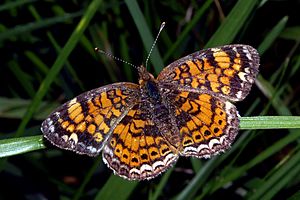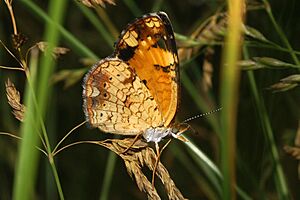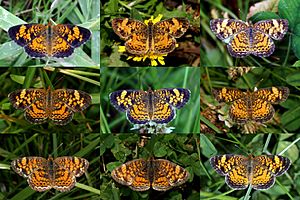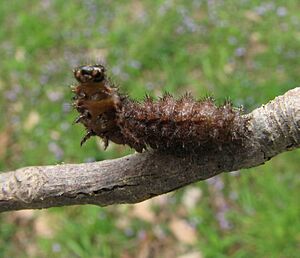Pearl crescent facts for kids
Quick facts for kids Pearl crescent |
|
|---|---|
 |
|
| Conservation status | |
| Scientific classification |
The pearl crescent (Phyciodes tharos) is a small, colorful butterfly found across North America. You can spot it in most parts of the United States, except for the West Coast. It also lives throughout Mexico and in some areas of southern Canada, like Ontario.
This butterfly loves open spaces. You might find it fluttering in sunny pastures, along road edges, in empty lots, open fields, or even in pine woods. Its wing patterns can look a bit different from one butterfly to another.
Contents
Meet the Pearl Crescent Butterfly
What It Looks Like
The pearl crescent is a small butterfly. Its wingspan, which is the distance from one wingtip to the other, is usually between 21 and 34 millimeters. That's about the length of a few paperclips!
The top side of its wings is mostly orange with black edges. You'll also see fine black lines crossing the middle and outer parts of its wings. Male pearl crescents often have black tips on their antennae.
If you look at the underside of its hindwing (the back wing), you'll notice a dark spot near the edge. Inside this dark spot, there's a light-colored, curved mark that looks like a crescent moon. This is how the butterfly gets its name!
Life Cycle and Habits
Pearl crescents have several generations, or "broods," of butterflies each year. In cooler northern areas, they fly from April to November. In warmer places like the deep south of the U.S. and Mexico, you can see them all year long.
Adult pearl crescent butterflies enjoy drinking nectar from many different kinds of flowers. Some of their favorite flowers include dogbane, swamp milkweed, shepherd's needle, asters, and winter cress.
Male butterflies fly around open areas looking for females. Once they find a mate, the female lays her eggs in small groups. She places them on the underside of the leaves of plants that the caterpillars will eat.
When the eggs hatch, tiny caterpillars emerge. These caterpillars eat the leaves of their host plants. When they are young, they like to stay together in groups. The caterpillars spend the winter, or "hibernate," when they are about one-third grown. They will then finish growing in the spring.
Similar Butterflies
Sometimes, it can be tricky to tell the pearl crescent apart from other butterflies. Here are a couple of similar species you might see:
- Phyciodes batesii – This is known as the tawny crescent.
- Phyciodes cocyta – This one is called the northern crescent.





